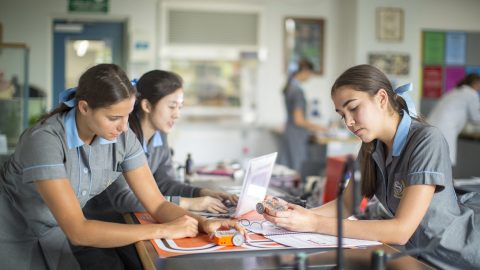From the Principal

Announcement – School Co-Captains
It gives me great pleasure to announce that Georgina Cottrill and Kavina Kalaichelvam are the School Co-Captains for 2019.
I have no doubt that they will perform their roles with dedication, commitment and distinction.
The Student Executive for 2019 will comprise of the following students:
Clementine Aston; Annelise Cody; Georgina Cottrill; Kavina Kalaichelvam; Hope Kudelka; Emily Sutherland
Academic Program 2019
Upon his commencement at St Catherine’s School, our Director of Teaching and Learning, Mr Robert Marshall, conducted an audit of the academic programs offered in the Senior School. This began in Term 4, 2017 and consisted of interviews with approximately 80 teachers and a review of internal and external academic data to identify trends in student performance in order to capture students’ engagement in their learning. With a long career in independent schools and considerable experience with the Australian Council of Educational Research, Mr Marshall has an extensive level of knowledge in reviewing school academic programs.
Mr Marshall’s overwhelming first impressions of St Catherine’s included:
- “St Catherine’s is a school where teachers are highly invested in the success of the girls, particularly the VCE achievements.”
- “We devote considerable time to working closely with students, both within class and additional time utilised outside lesson time.”
- “There is a high level of personalised academic care and an emphasis on creating a vibrant education, pertinent for the 21st century.”
- “The School’s focus remains firmly on enabling each girl to be the best they can be.”
In addition to the valuable teacher conversations and examination of academic data, external research with regard to the broad educational trends occurring in Australia, were also considered. The weight of educational research strongly suggests that ‘time on task’ and a ‘deeper focus’ are more likely to produce deeper learning and, hence, a valuable educational experience and stronger academic results. Importantly, this research incorporated the findings of Mr Andreas Schleicher, Director for the Directorate of Education and Skills – OECD. Schleicher’s commentary at the Association of Heads of Independent Schools of Australia Conference with Principals in September 2017 included:
“One barrier to Australian schools teaching higher order skills systems was an overcrowded curriculum. The [Australian] curriculum is a mile wide and an inch deep. It’s very crowded, with a lot of content. Whereas in many high-performing [school] systems you have more rigour in terms of cognitive demand, more focus in teaching fewer things in greater depth, and more coherence in terms of learning progressions.”
Schleicher said,“the Australian curriculum suffered from being ‘negotiated’ by too many players. In contrast, Singapore and Finland have curricula which are carefully designed. If you want to develop high order thinking skills, you really need highly professional knowledge workers who can deliver that.”
The culmination of the work by Mr Marshall has led to a two-pronged approach to further develop the teaching and learning programs at St Catherine’s. Firstly, the appointment of Miss Kristy Forrest as a Pedagogical Coach for teaching staff. Miss Forrest has focussed her work on the practice of classroom teaching and the implementation of rigorous programs and assessments across the school. Most notably, this has included the introduction of clearly defined learning intentions and the development of succinct success criteria with the integrated use of assessment matrices. Identifying the practices of our high performing faculties and teachers, and leveraging from this identified best practice, has also been a focus this year.
Secondly, the development of a new academic structure that alters the time allocations for subjects in the 2019 timetable. Such a structural change to the program required lengthy consultation with our teaching staff, and importantly our faculty leaders. The expertise across staff is considered to be of high value with staff bringing to the table substantial experience teaching VCE subjects and many years’ experience as VCE Examination Assessors.
The program review incorporated the following inquiry areas:
- What is the best school structure to enable girls’ learning?
- What systemic change might be necessary at St Catherine’s to support every student in the School to be the best they can be?
- What does Andreas Schleicher’s comment: “Australian education is a mile wide but an inch deep” mean for St Catherine’s?
- Is the subject load for Years 7 and 8 students too much? (Currently 13 different subjects and teachers.)
- Does the current system of combining Years 9 and 10 electives adequately prepare students for VCE?
- How do we reduce the transition between Year 10 and Year 11?
- How can we best allocate 80 lessons?
Within the review process, our Head of Science Faculty, Ms Vanessa Jackson-McRae, wished to incorporate an alternative to the delivery of the current Year 10 Science program. A change from a mainstream compulsory Science subject for all students to offering semester long elective courses in the four Science disciplines: Chemistry, Biology, Physics and Psychology, will enable an improved student readiness for the extensive VCE Science curriculum.
By offering specialist Science disciplines within the elective options, students will study an increased number of classes per cycle. This will ultimately provide 25% more classes in the specific Science discipline. This is a shift from approximately 133 periods in a discipline each year to approximately 180 periods in 2019. The structure for 2019 will enable the sciences to be studied at greater depth, and for those who desire to pursue these disciplines, allow far more time than is available in the majority of schools.
In effect, the School has actually provided a pathway for a greater focus on science, technology, engineering and maths (STEM) than has been possible in the current structure. As such, a keen science student will be able to select any one of the Science disciplines for a whole semester, and theoretically could do the equivalent of two years of Science in Year 10 if all four Science disciplines were chosen. Of course, this scenario, would place limits on the other electives selected. We are anticipating that the majority of girls are likely to select at least one Science discipline from the four: Biology, Psychology, Physics or Chemistry, with the option of VCE Biology and Psychology also available for Year 10 students. The flip side to this scenario is that some girls may not wish to pursue Science in their VCE program and therefore, are able to focus on other fields such as Humanities or the Arts.
The final rationale to change the period allocations for subjects included:
- Years 7 and 8 students need to have less subjects and activities to engage with, thus reducing breadth, but increasing depth of learning with an improved ‘time on task’.
- The core subjects, as identified by the Australian Curriculum, Assessment and Reporting Authority, English, Mathematics, Science and Humanities, need to be emphasised and receive an equitable allocation in the timetable.
- The development of an intentional link of the Year 10 course of study with the VCE program and to establish a ‘towards VCE focus’. This would incorporate a ‘narrow and sharpen’ in the girls’ approach to selecting subjects. Ultimately, we believe this will incorporate a heightened academic focus with greater coverage and depth across the curriculum material.
- Encouraging Year 9 students to diversify their learning experiences through engagement of subject specific disciplines in the elective offerings and a ‘have a go’ approach coupled within the need for challenge.
In summary, the changes for 2019 provide:
- Increased time for the core subjects of English, Mathematics, Science and Humanities.
- A greater allocation of time for LOTE in Years 7 and 8 with a focus to improve foundation in these subjects, enabling greater acceleration at Years 9 and 10 in readiness for VCE.
- Electives at Years 9 and 10 will continue to allow for the pursuit of special interests and for increased depth of study leading into VCE.
- Years 7 and 8 students will have less subjects to engage with, thus reducing breadth but increasing depth.
Parents are encouraged to contact Mr Robert Marshall should they wish to receive further information about the change to the academic program for Years 7 to 10 in 2019. As a school, we look forward to working closely with students and staff to understand the impact of these changes in the coming years, in particular, monitoring the readiness in which they approach their VCE years.
Father’s Day
I wish all families an enjoyable Father’s Day on Sunday as you celebrate this special day.
Spring Music Concert on Friday 7 September
I am looking forward to attending the Spring Music Concert on Friday 7 September at Scotch College. Our VCE music students Madison Hunt, Phoebe Hamilton, Lauren Lew and Maria Wu will be performing highlights from their VCE repertoire. The concert will feature students from Years 7 to 12 who will work closely beside our wonderful instrumental staff to produce a concert full of variety and joy.
Parents and family members are invited to purchase their tickets prior to the evening through the linked account: https://www.trybooking.com/XMNZ
Medical Volunteers Required for the 2018 Sony Foundation Children’s Holiday Camp
St Catherine’s School has joined with Scotch College to host the three day Sony Foundation Holiday Camp in December this year. The Camp, sponsored by Sony, is a Holiday Camp for children with disabilities, allowing respite for them and their family just before Christmas. The camp will run from 14 to 16 December at Scotch College. Sixteen of our Year 11 students will take part in this very rewarding volunteer experience.
We are seeking assistance from medical personnel in the School Community to ensure the campers’ medical needs are met during the camp. We require volunteers who are registered nurses or doctors to be rostered on each day, as well as on call. We are requesting that our medical volunteers do one eight hour shift (morning, evening or night).
The camp begins at 10.00am on Friday 14 December and concludes at 3.00pm on Sunday 16 December. With two schools involved, we hope to be able to cover each shift, although in the past some people have volunteered for more shifts.
A compulsory preliminary meeting for all medical volunteers will be held at Scotch College on Tuesday 4 December at 6.30pm. At this meeting, we require at least five medical personnel to volunteer to contact the parents of our campers to gain background information. These medical personnel would then need to be present for an hour at our Companions’ Training Day on Sunday 9 December to brief our student companions on their particular camper.
It is a legal requirement that all medical volunteers have a valid Working With Children (WWC) Check. If you don’t have one, you can apply for a voluntary WWC Check (no fee applies) online. When applying online, the following details need to be entered under “Organisation details”:
Organisation Name: Scotch College
Postal Address: 1 Morrison Street, Hawthorn 3122
Phone: (03) 9810 4321
Occupational work code: All overnight camps for children
Medical volunteers are asked to provide details of their medical or nursing registration and WWC Check at the initial meeting.
For more information, please contact Melissa Braddy, Head of Year 11 on (03) 9822 1285 or email mbraddy@stcatherines.net.au.




